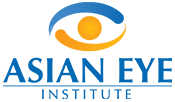
Children always assume that whatever vision they have is normal. They rarely complain about eye problems because they have no alternative experience to compare it with. However, having poor vision can impede their learning and development and affect the way they interact with other children. That is why it is important for parents to be aware of signs and symptoms that show a child suffering from an eye problem.
“Some serious eye problems have no early warning signs,” says Asian Eye Institute Pediatric Ophthalmologist and Adult Strabismus Specialist Dr. Norman Fajardo, “Parents have to observe if their children consistently sit near the TV or hold a book too close, rub their eyes frequently, squint or tilt their head to see better. Other children complain of frequent headaches, experience extreme sensitivity to light and excessive tearing, or have one eye turning in or out.”
Low degree or amount of refractive errors (nearsightedness, farsightedness and astigmatism) is common among children. However, they may be prone to suffer from other eye problems like lazy eye (the brain ignores the images from the eye) which can be caused by high degree of refractive errors, strabismus (misaligned eyes; one eye may look straight ahead, while the other turns in, out, up or down), glaucoma (abnormally high eye pressure) and cataract (clouding of the normally clear lens of the eye).
Dr. Fajardo points out, “As parents, your best defense is to have them undergo eye screening. Children should have their eyes screened as soon as they are born and at regular intervals afterwards. Formal vision test can begin as early as age 3 and before going to school to catch eye and vision problems that may affect their learning.”
If the child is not diagnosed with any eye problems, a routine eye checkup can be done every two years. However, those with existing eye problems and those who were born prematurely, have developmental delays, or are cross-eyed should undergo checkup depending on the recommendation of their pediatric eye doctor.
“If you think your child is experiencing an eye problem, take them to a pediatric ophthalmologist immediately. The earlier your child’s eye problem is detected, the better. Children are more responsive to treatment when diagnosed early, and it reduces the risk of permanent visual impairment,” he adds.
Asian Eye Institute offers comprehensive eye checkups for children. A pediatric optometrist and pediatric ophthalmologists are available to help care for your child’s vision.






